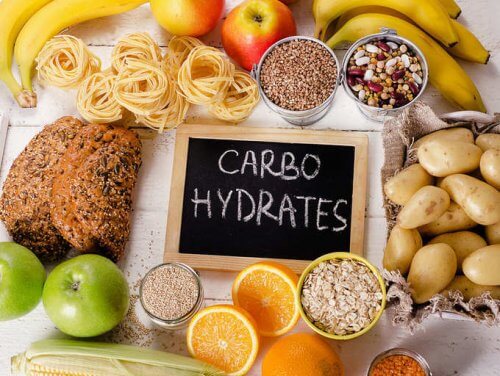Carbohydrate… Friend or Foe??
25th October 2020

Carbs, they’re one of the most spoken about nutrients in diet and fitness, but what are they? Why are they needed? And what happens if we don’t get enough? Well, all will be answered soon! But firstly what actually are carbs? Carbohydrates are 1 of 3 macronutrients (nutrients that make up a large part of our diet) found in food. The others are fat and protein.
Hardly any foods contain only 1 nutrient, and most are a combination of carbohydrates, fats and proteins in varying amounts. There are 3 different types of carbohydrates found in food: sugar, starch and fibre.
Sugar: It’s useful to know about two types of different sugars, firstly refined sugar, original source is from sugar beet or sugar cane, which is processed and sugar is extracted. These are sugars that are added to food or drinks, such as biscuits, chocolate and fizzy drinks. There is also a natural sugar called fructose which are found naturally in foods like honey, fruits, and no added sugar juices. They release quick energy not long after being eaten.
Starch: Starch is a complex carbohydrate found in bread, rice, potatoes and pasta, provide a slow and steady release of energy throughout the day.
Fibre is found in foods that come from plants. Good sources of fibre include fruit and vegetables, wholegrain bread, wholewheat pasta, and pulses like beans, chickpeas and lentils they also release energy slowly throughout the day.
So now your wondering, how many carbs should I eat and which diet would work best for me? Well, let’s take a look at a no/low-carb diet.
Firstly, no-carb/low-carb diets. Someone on this type of diet avoid foods like grains, beans, fruits, vegetables, milk, yoghurt, pasta and bread. Instead, they will eat foods that contain primarily protein or fat, such as meats, fish, eggs and cheese.
One example of a no/low-carb diet is a ketogenic diet, which limits your carb intake to fewer than 50 (and sometimes even 30) grams per day and encourages you to get most of your daily calories from fat. The number 1 benefit of low carb dieting is weight loss, If you can stick to a low carb plan, you will lose weight.
The huge disadvantage to a low/ no carbohydrate diet is its sends your body into a state called ketosis…. which to put it bluntly makes your breath smell, however thats probably the least of your problems when you compare it to the the following issues which can be caused by the keto diet: Low blood pressure, kidney stones, constipation, an increased risk of heart disease and nutrient deficiencies…. is that enough to put you off??
As we can see here dieting is all about moderation and going to the extreme (on either side of the spectrum) is rarely a great option. So if you want to lose weight quick remember:
-Complex carbs are a better option as they give you enough energy to use throughout the day
-The key is in portion control rather than cutting out thing completely
-Everyone’s body is different so go with what works for you and don’t always trust exactly what the internet says
And the big one…
Dieting is only 1/3 of weight loss, your physical exercise and mindset play massive parts if you don’t exercise enough and if you’re not willing enough to resist that bag of crisps and change for the better then you’re not going to see results.
That’s all for today but be sure to check our social media for more info on topics like these, and book now to help achieve your goals, also check out our recent special offer:
As part of our Covid-19 scheme the first 19 people to sign up after Coronavirus receive £25 off their booking! Only 2 spaces remaining!
